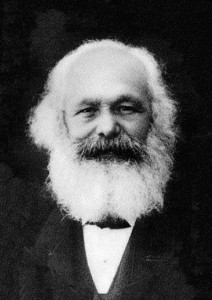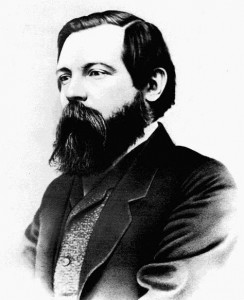2 Classical Sociological Theories
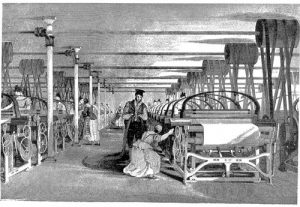
A Roberts loom in a weaving shed in 1835 (Image courtesy of Wikimedia Commons)
Learning Objectives
2.0 Industrial Societies
- Understand the impact of the industrial revolution.
2.1. Theoretical Perspectives on the Formation of Modern Society
- Describe Durkheim’s functionalist view of modern society.
- Understand the critical sociology view of modern society.
- Explain the difference between Marx’s concept of alienation and Weber’s concept of rationalization.
- Identify how feminists analyze the development of society.
2.2. Living in Capitalist Society
- Understand the relationship between capitalism and the incessant change of modern life.
2.0 Industrial Societies
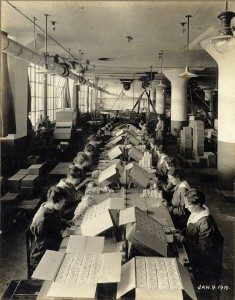 Figure 2.10. Wrapping bars of soap at the Colgate-Palmolive Canada plant, Toronto, 1919. (Image courtesy of the Toronto Public Library/Wikimedia Commons)
Figure 2.10. Wrapping bars of soap at the Colgate-Palmolive Canada plant, Toronto, 1919. (Image courtesy of the Toronto Public Library/Wikimedia Commons)
2.1 The Impact of the Industrial Revolution
In the 18th century, Europe experienced a dramatic rise in technological invention, ushering in an era known as the Industrial Revolution. What made this period remarkable was the number of new inventions that influenced people’s daily lives. Within a generation, tasks that had until this point required months of labour became achievable in a matter of days. Before the Industrial Revolution, work was largely person- or animal-based, relying on human workers or horses to power mills and drive pumps. In 1782, James Watt and Matthew Boulton created a steam engine that could do the work of 12 horses by itself.
Steam power began appearing everywhere. Instead of paying artisans to painstakingly spin wool and weave it into cloth, people turned to textile mills that produced fabric quickly at a better price, and often with better quality. Rather than planting and harvesting fields by hand, farmers were able to purchase mechanical seeders and threshing machines that caused agricultural productivity to soar. Products such as paper and glass became available to the average person, and the quality and accessibility of education and health care soared. Gas lights allowed increased visibility in the dark, and towns and cities developed a nightlife.
One of the results of increased wealth, productivity, and technology was the rise of urban centres. Serfs and peasants, expelled from their ancestral lands, flocked to the cities in search of factory jobs, and the populations of cities became increasingly diverse. The new generation became less preoccupied with maintaining family land and traditions, and more focused on survival. Some were successful in acquiring wealth and achieving upward mobility for themselves and their family. Others lived in devastating poverty and squalor. Whereas the class system of feudalism had been rigid, and resources for all but the highest nobility and clergy were scarce, under capitalism social mobility (both upward and downward) became possible.
It was during the 18th and 19th centuries of the Industrial Revolution that sociology was born. Life was changing quickly and the long-established traditions of the agricultural eras did not apply to life in the larger cities. Masses of people were moving to new environments and often found themselves faced with horrendous conditions of filth, overcrowding, and poverty. Social science emerged in response to the unprecedented scale of the social problems of modern society.
It was during this time that power moved from the hands of the aristocracy and “old money” to the new class of rising bourgeoisie who were able to amass fortunes in their lifetimes. In Canada, a new cadre of financiers and industrialists like Donald Smith (1st Baron Strathcona and Mount Royal) and George Stephen (1st Baron Mount Stephen) became the new power players, using their influence in business to control aspects of government as well. Eventually, concerns over the exploitation of workers led to the formation of labour unions and laws that set mandatory conditions for employees. Although the introduction of new “postindustrial” technologies (like computers) at the end of the 20th century ended the industrial age, much of our social structure and social ideas — such as the nuclear family, left-right political divisions, and time standardization — have a basis in industrial society.
2.1 Theoretical Perspectives on the Formation of Modern Society
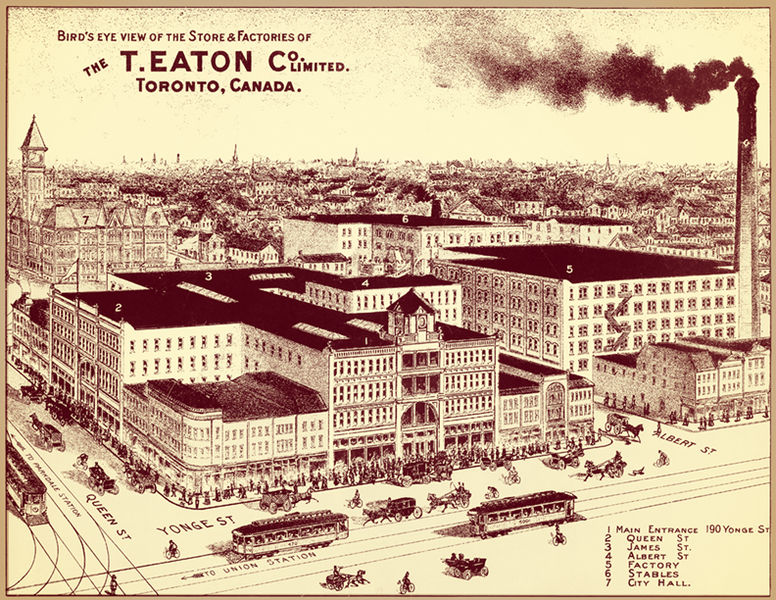
While many sociologists have contributed to research on society and social interaction, three thinkers provide the basis of modern-day perspectives. Émile Durkheim, Karl Marx, and Max Weber developed different theoretical approaches to help us understand the development of modern capitalist society. In the following discussion of modern society, we examine Durkheim’s, Marx’s and Weber’s analytical focus on another foundational sociological concept: social structure.As we saw in Chapter 1, social structures can be defined as general patterns of social behaviour and organization that persist through time. Here Durkheim’s analysis focuses on the impacts of the growing division of labour as a uniquely modern social structure, Marx’s on the economic structures of capitalism (private property, class, competition, crisis, etc.), and Weber’s on the rationalized structures of modern organization. While the aspect of modern structure that Durkheim, Marx and Weber emphasize differs, their common approach is to stress the impact of social structure on culture and ways of life rather than the other way around. This remains a key element of sociological explanation today.
Émile Durkheim and Functionalism
Émile Durkheim’s (1858-1917) key focus in studying modern society was to understand the conditions under which social and moral cohesion could be reestablished. He observed that European societies of the 19th century had undergone an unprecedented and fractious period of social change that threatened to dissolve society altogether. In his book The Division of Labour in Society (1893/1960), Durkheim argued that as modern societies grew more populated, more complex, and more difficult to regulate, the underlying basis of solidarity or unity within the social order needed to evolve. His primary concern was that the cultural glue that held society together was failing, and that the divisions between people were becoming more conflictual and unmanageable. Therefore Durkheim developed his school of sociology to explain the principles of cohesiveness of societies (i.e., their forms of social solidarity) and how they change and survive over time. He thereby addressed one of the fundamental sociological questions: why do societies hold together rather than fall apart?
Two central components of social solidarity in traditional, premodern societies were the common collective conscience — the communal beliefs, morals, and attitudes of a society shared by all — and high levels of social integration — the strength of ties that people have to their social groups. These societies were held together because most people performed similar tasks and shared values, language, and symbols. There was a low division of labour, a common religious system of social beliefs, and a low degree of individual autonomy. Society was held together on the basis of mechanical solidarity: a minimal division of labour and a shared collective consciousness with harsh punishment for deviation from the norms. Such societies permitted a low degree of individual autonomy. Essentially there was no distinction between the individual conscience and the collective conscience.
Societies with mechanical solidarity act in a mechanical fashion; things are done mostly because they have always been done that way. If anyone violated the collective conscience embodied in laws and taboos, punishment was swift and retributive. This type of thinking was common in preindustrial societies where strong bonds of kinship and a low division of labour created shared morals and values among people, such as among the feudal serfs. When people tend to do the same type of work, Durkheim argued, they tend to think and act alike.
Modern societies, according to Durkheim, were more complex. Collective consciousness was increasingly weak in individuals and the ties of social integration that bound them to others were increasingly few. Modern societies were characterized by an increasing diversity of experience and an increasing division of people into different occupations and specializations. They shared less and less commonalities that could bind them together. However, as Durkheim observed, their ability to carry out their specific functions depended upon others being able to carry out theirs. Modern society was increasingly held together on the basis of a division of labour or organic solidarity: a complex system of interrelated parts, working together to maintain stability, i.e., like an organism (Durkheim, 1893/1960).
According to his theory, as the roles individuals in the division of labour become more specialized and unique, and people increasingly have less in common with one another, they also become increasingly interdependent on one another. Even though there is an increased level of individual autonomy — the development of unique personalities and the opportunity to pursue individualized interests — society has a tendency to cohere because everyone depends on everyone else. The academic relies on the mechanic for the specialized skills required to fix his or her car, the mechanic sends his or her children to university to learn from the academic, and both rely on the baker to provide them with bread for their morning toast. Each member of society relies on the others. In premodern societies, the structures like religious practice that produce shared consciousness and harsh retribution for transgressions function to maintain the solidarity of society as a whole; whereas in modern societies, the occupational structure and its complex division of labour function to maintain solidarity through the creation of mutual interdependence.
While the transition from mechanical to organic solidarity is, in the long run, advantageous for a society, Durkheim noted that it creates periods of chaos and “normlessness.” One of the outcomes of the transition is social anomie. Anomie — literally, “without norms” — is a situation in which society no longer has the support of a firm collective consciousness. There are no clear norms or values to guide and regulate behaviour. Anomie was associated with the rise of industrial society, which removed ties to the land and shared labour; the rise of individualism, which removed limits on what individuals could desire; and the rise of secularism, which removed ritual or symbolic foci and traditional modes of moral regulation. During times of war or rapid economic development, the normative basis of society was also challenged. People isolated in their specialized tasks tend to become alienated from one another and from a sense of collective conscience. However, Durkheim felt that as societies reach an advanced stage of organic solidarity, they avoid anomie by redeveloping a set of shared norms. According to Durkheim, once a society achieves organic solidarity, it has finished its development.
Karl Marx and Critical Sociology
For Marx, the creation of modern society was tied to the emergence of capitalism as a global economic system. In the mid-19th century, as industrialization was expanding, Karl Marx (1818–1883) observed that the conditions of labour became more and more exploitative. The large manufacturers of steel were particularly ruthless, and their facilities became popularly dubbed “satanic mills” based on a poem by William Blake. Marx’s colleague and friend, Frederick Engels, wrote The Condition of the Working-Class in England in 1844, which described in detail the horrid conditions.
Such is the Old Town of Manchester, and on re-reading my description, I am forced to admit that instead of being exaggerated, it is far from black enough to convey a true impression of the filth, ruin, and uninhabitableness, the defiance of all considerations of cleanliness, ventilation, and health which characterise the construction of this single district, containing at least twenty to thirty thousand inhabitants. And such a district exists in the heart of the second city of England, the first manufacturing city of the world (1812).
Add to that the long hours, the use of child labour, and exposure to extreme conditions of heat, cold, and toxic chemicals, and it is no wonder that Marx referred to capital as “dead labour, that, vampire-like, only lives by sucking living labour, and lives the more, the more labour it sucks” (Marx, 1867/1995).
As we saw at the beginning of the chapter, Marx’s explanation of the exploitative nature of industrial society draws on a more comprehensive theory of the development of human societies from the earliest hunter-gatherers to the modern era: historical materialism. For Marx, the underlying structure of societies and of the forces of historical change was predicated on the relationship between the “base and superstructure” of societies. In this model, society’s economic structure forms its base, on which the culture and other social institutions rest, forming its superstructure. For Marx, it is the base—the economic mode of production—that determines what a society’s culture, law, political system, family form, and, most importantly, its typical form of struggle or conflict will be like. Each type of society—hunter-gatherer, pastoral, agrarian, feudal, capitalist—could be characterized as the total way of life that forms around different economic bases.
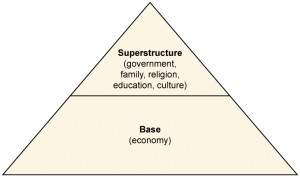
Marx saw economic conflict in society as the primary means of change. The base of each type of society in history — its economic mode of production — had its own characteristic form of economic struggle. This was because a mode of production is essentially two things: the means of production of a society — anything that is used in production to satisfy needs and maintain existence (e.g., land, animals, tools, machinery, factories, etc.) — and the relations of production of a society — the division of society into economic classes (the social roles allotted to individuals in production). Marx observed historically that in each epoch or type of society since the early “primitive communist” foraging societies, only one class of persons has owned or monopolized the means of production. Different epochs are characterized by different forms of ownership and different class structures: hunter-gatherer (classless/common ownership), agricultural (citizens/slaves), feudal (lords/peasants), and capitalism (capitalists/“free” labourers). As a result, the relations of production have been characterized by relations of domination since the emergence of private property in the early Agrarian societies. Throughout history, societies have been divided into classes with opposed or contradictory interests. These “class antagonisms,” as he called them, periodically lead to periods of social revolution in which it becomes possible for one type of society to replace another.
The most recent revolutionary transformation resulted in the end of feudalism. A new revolutionary class emerged from among the freemen, small property owners, and middle-class burghers of the medieval period to challenge and overthrow the privilege and power of the feudal aristocracy. The members of the bourgeoisie or capitalist class were revolutionary in the sense that they represented a radical change and redistribution of power in European society. Their power was based in the private ownership of industrial property, which they sought to protect through the struggle for property rights, notably in the English Civil War (1642–1651) and the French Revolution (1789–1799). The development of capitalism inaugurated a period of world transformation and incessant change through the destruction of the previous class structure, the ruthless competition for markets, the introduction of new technologies, and the globalization of economic activity.
As Marx and Engels put it in The Communist Manifesto:
The bourgeoisie, wherever it has got the upper hand, has put an end to all feudal, patriarchal, idyllic relations. It has pitilessly torn asunder the motley feudal ties that bound man to his “natural superiors”, and has left remaining no other nexus between man and man than naked self-interest, than callous “cash payment.” It has drowned the most heavenly ecstasies of religious fervour, of chivalrous enthusiasm, of philistine sentimentalism, in the icy water of egotistical calculation…. The bourgeoisie cannot exist without constantly revolutionising the instruments of production, and thereby the relations of production, and with them the whole relations of society (1848/1977).
However, the rise of the bourgeoisie and the development of capitalism also brought into existence the class of “free” wage labourers, or the proletariat. The proletariat were made up largely of guild workers and serfs who were freed or expelled from their indentured labour in feudal guild and agricultural production and migrated to the emerging cities where industrial production was centred. They were “free” labour in the sense that they were no longer bound to feudal lords or guildmasters. The new labour relationship was based on a contract. However, as Marx pointed out, this meant in effect that workers could sell their labour as a commodity to whomever they wanted, but if they did not sell their labour they would starve. The capitalist had no obligations to provide them with security, livelihood, or a place to live as the feudal lords had done for their serfs. The source of a new class antagonism developed based on the contradiction of fundamental interests between the bourgeois owners and the wage labourers: where the owners sought to reduce the wages of labourers as far as possible to reduce the costs of production and remain competitive, the workers sought to retain a living wage that could provide for a family and secure living conditions. The outcome, in Marx and Engel’s words, was that “society as a whole is more and more splitting up into two great hostile camps, into two great classes directly facing each other — Bourgeoisie and Proletariat” (1848/1977).
Making Connections: Sociological Concepts
Marx and the Theory of Alienation

For Marx, what we do defines who we are. What it is to be “human” is defined by the capacity we have as a species to creatively transform the world in which we live to meet our needs for survival. Humanity at its core is Homo faber (“Man the Creator”). In historical terms, in spite of the persistent nature of one class dominating another, the element of humanity as creator existed. There was at least some connection between the worker and the product, augmented by the natural conditions of seasons and the rising and setting of the sun, such as we see in an agricultural society. But with the bourgeois revolution and the rise of industry and capitalism, workers now worked for wages alone. The essential elements of creativity and self-affirmation in the free disposition of their labour was replaced by compulsion. The relationship of workers to their efforts was no longer of a human nature, but based purely on animal needs. As Marx put it, the worker “only feels himself freely active in his animal functions of eating, drinking, and procreating, at most also in his dwelling and dress, and feels himself an animal in his human functions” (1932/1977).
Marx described the economic conditions of production under capitalism in terms of alienation. Alienation refers to the condition in which the individual is isolated and divorced from his or her society, work, or the sense of self and common humanity. Marx defined four specific types of alienation that arose with the development of wage labour under capitalism.
Alienation from the product of one’s labour. An industrial worker does not have the opportunity to relate to the product he or she is labouring on. The worker produces commodities, but at the end of the day the commodities not only belong to the capitalist, but serve to enrich the capitalist at the worker’s expense. In Marx’s language, the worker relates to the product of his or her labour “as an alien object that has power over him [or her]” (1932/1977). Workers do not care if they are making watches or cars; they care only that their jobs exist. In the same way, workers may not even know or care what products they are contributing to. A worker on a Ford assembly line may spend all day installing windows on car doors without ever seeing the rest of the car. A cannery worker can spend a lifetime cleaning fish without ever knowing what product they are used for.
Alienation from the process of one’s labour. Workers do not control the conditions of their jobs because they do not own the means of production. If someone is hired to work in a fast food restaurant, that person is expected to make the food exactly the way they are taught. All ingredients must be combined in a particular order and in a particular quantity; there is no room for creativity or change. An employee at Burger King cannot decide to change the spices used on the fries in the same way that an employee on a Ford assembly line cannot decide to place a car’s headlights in a different position. Everything is decided by the owners who then dictate orders to the workers. The workers relate to their own labour as an activity that does not belong to them.
Alienation from others. Workers compete, rather than cooperate. Employees vie for time slots, bonuses, and job security. Different industries and different geographical regions compete for investment. Even when a worker clocks out at night and goes home, the competition does not end. As Marx commented in The Communist Manifesto, “No sooner is the exploitation of the labourer by the manufacturer, so far at an end, that he receives his wages in cash, than he is set upon by the other portion of the bourgeoisie, the landlord, the shopkeeper, the pawnbroker” (1848/1977).
Alienation from one’s humanity. A final outcome of industrialization is a loss of connectivity between a worker and what makes them truly human. Humanity is defined for Marx by “conscious life-activity,” but under conditions of wage labour this is taken not as an end in itself — only a means of satisfying the most base, animal-like needs. The “species being” (i.e., conscious activity) is only confirmed when individuals can create and produce freely, not simply when they work to reproduce their existence and satisfy immediate needs like animals.
Taken as a whole, then, alienation in modern society means that individuals have no control over their lives. There is nothing that ties workers to their occupations. Instead of being able to take pride in an identity such as being a watchmaker, automobile builder, or chef, a person is simply a cog in the machine. Even in feudal societies, people controlled the manner of their labour as to when and how it was carried out. But why, then, does the modern working class not rise up and rebel?
In response to this problem, Marx developed the concept of false consciousness. False consciousness is a condition in which the beliefs, ideals, or ideology of a person are not in the person’s own best interest. In fact, it is the ideology of the dominant class (here, the bourgeoisie capitalists) that is imposed upon the proletariat. Ideas such as the emphasis of competition over cooperation, of hard work being its own reward, of individuals as being the isolated masters of their own fortunes and ruins, etc. clearly benefit the owners of industry. Therefore, to the degree that workers live in a state of false consciousness, they are less likely to question their place in society and assume individual responsibility for existing conditions.
Like other elements of the superstructure, “consciousness,” is a product of the underlying economic; Marx proposed that the workers’ false consciousness would eventually be replaced with class consciousness — the awareness of their actual material and political interests as members of a unified class. In The Communist Manifesto, Marx and Engels wrote,
The weapons with which the bourgeoisie felled feudalism to the ground are now turned against the bourgeoisie itself. But not only has the bourgeoisie forged the weapons that bring death to itself; it has also called into existence the men who are to wield those weapons — the modern working class — the proletarians (1848/1977).
Capitalism developed the industrial means by which the problems of economic scarcity could be resolved and, at the same time, intensified the conditions of exploitation due to competition for markets and profits. Thus emerged the conditions for a successful working class revolution. Instead of existing as an unconscious “class in itself,” the proletariat would become a “class for itself” and act collectively to produce social change (Marx and Engels, 1848/1977). Instead of just being an inert strata of society, the class could become an advocate for social improvements. Only once society entered this state of political consciousness would it be ready for a social revolution. Indeed, Marx predicted that this would be the ultimate outcome and collapse of capitalism.
To summarise, for Marx, the development of capitalism in the 18th and 19th centuries was utterly revolutionary and unprecedented in the scope and scale of the societal transformation it brought about. In his analysis, capitalism is defined by a unique set of features that distinguish it from previous modes of production like feudalism or agrarianism:
- The means of production (i.e., productive property or capital) are privately owned and controlled.
- Capitalists purchase labour power from workers for a wage or salary.
- The goal of production is to profit from selling commodities in a competitive-free market.
- Profit from the sale of commodities is appropriated by the owners of capital. Part of this profit is reinvested as capital in the business enterprise to expand its profitability.
- The competitive accumulation of capital and profit leads to capitalism’s dynamic qualities: constant expansion of markets, globalization of investment, growth and centralization of capital, boom and bust cycles, economic crises, class conflict, etc.
These features are structural, meaning that they are built-into, and reinforced by, the institutional organization of the economy. They are structures, or persistent patterns of social relationship that exist, in a sense, prior to individuals’ personal or voluntary choices and motives. As structures, they can be said to define the rules or internal logic that underlie the surface or observable characteristics of a capitalist society: its political, social, economic, and ideological formations. Some isolated cases may exist where some of these features do not apply, but they define the overall system that has come to govern the contemporary global economy.
Marx’s analysis of the transition from feudalism to capitalism is historical and materialist because it focuses on the changes in the economic mode of production to explain the transformation of the social order. The expansion of the use of money, the development of commodity markets, the introduction of rents, the accumulation and investment of capital, the creation of new technologies of production, and the early stages of the manufactory system, etc. led to the formation of a new class structure (the bourgeoisie and the proletariat), a new political structure (the nation state), and a new ideological structure (science, human rights, individualism, rationalization, the belief in progress, etc.). The unprecedented transformations that created the modern era — urbanization, colonization, population growth, resource exploitation, social and geographical mobility, etc. — originated in the transformation of the mode of production from feudalism to capitalism. “Only the capitalist production of commodities revolutionizes … the entire economic structure of society in a manner eclipsing all previous epochs” (Marx, 1878). In the space of a couple of hundred years, human life on the planet was irremediably and radically altered. As Marx and Engels put it, capitalism had “create[d] a world after its own image” (1848/1977 ).
Max Weber and Interpretive Sociology
Like the other social thinkers discussed here, Max Weber (1864–1920) was concerned with the important changes taking place in Western society with the advent of capitalism. Arguably, the primary focus of Weber’s entire sociological oeuvre was to determine how and why Western civilization and capitalism developed, and where and when they developed. Why was the West the West? Why did the capitalist system develop in Europe and not elsewhere? Like Marx and Durkheim, he feared that capitalist industrialization would have negative effects on individuals but his analysis differed from theirs in significant respects. Key to the answer to his questions was the concept of rationalization. If other societies had failed to develop modern capitalist enterprise, modern science, and modern, efficient organizational structures, it was because in various ways they had impeded the development of rationalization. Weber’s question was: what are the consequences of rationality for everyday life, for the social order, and for the spiritual fate of humanity?
Unlike Durkheim’s functionalist emphasis on the sources of social solidarity and Marx’s critical emphasis on the materialist basis of class conflict, Weber’s interpretive perspective on modern society emphasizes the development of a rationalized worldview or stance, which he referred to as the disenchantment of the world: “principally there are no mysterious incalculable forces that come into play, but rather one can, in principle, master all things by calculation” (1919/1969). In other words, the processes of rationalization and disenchantment refer principally to the mode in which modern individuals and institutions interpret or analyze the world and the problems that confront them. As we saw in Chapter 3, rationalization refers to the general tendency in modern society for all institutions and most areas of life to be transformed by the application of rational principles of efficiency and calculation. It overcomes forms of magical thinking and replaces them with cold, objective calculations based on principles of technical efficiency. Older styles of social organization, based on traditional principles of religion, morality, or custom, cannot compete with the efficiency of rational styles of organization and are gradually replaced.
To Weber, capitalism itself became possible through the processes of rationalization. The emergence of capitalism in the West required the prior existence of rational, calculable procedures like double-entry bookkeeping, free labour contracts, free market exchange, and predictable application of law so that it could operate as a form of rational enterprise. Unlike Marx who defined capitalism in terms of the ownership of private property, Weber defined it in terms of its rational processes. For Weber, capitalism is as a form of continuous, calculated economic action in which every element is examined with respect to the logic of investment and return. As opposed to previous types of economic action in which wealth was acquired by force and spent on luxuries, capitalism rested “on the expectation of profit by the utilization of opportunities for exchange, that is, on (formally) peaceful chances for profit.” This implied a continual rationalization of commercial procedures in terms of the logic of capital accumulation. “Where capitalist acquisition is rationally pursued, the corresponding action is adjusted to calculations in terms of capital” (Weber, 1904/1958).
Weber’s analysis of rationalization did not exclusively focus on the conditions for the rise of capitalism however. Capitalism’s “rational” reorganization of economic activity was only one aspect of the broader process of rationalization and disenchantment. Modern science, law, music, art, bureaucracy, politics, and even spiritual life could only have become possible, according to Weber, through the systematic development of precise calculations and planning, technical procedures, and the dominance of “quantitative reckoning.” He felt that other non-Western societies, however highly sophisticated, had impeded these developments by either missing some crucial element of rationality or by holding to non-rational organizational principles or some element of magical thinking. For example, Babylonian astronomy lacked mathematical foundations, Indian geometry lacked rational proofs, Mandarin bureaucracy remained tied to Confucian traditionalism and the Indian caste system lacked the common “brotherhood” necessary for modern citizenship.
Weber argued however that although the process of rationalization leads to efficiency and effective, calculated decision making, it is in the end an irrational system. The emphasis on rationality and efficiency ultimately has negative effects when taken to its conclusion. In modern societies, this is seen when rigid routines and strict adherence to performance-related goals lead to a mechanized work environment and a focus on efficiency for its own sake. To the degree that rational efficiency begins to undermine the substantial human values it was designed to serve (i.e., the ideals of the good life, ethical values, the integrity of human relationships, the enjoyment of beauty and relaxation) rationalization becomes irrational.

An example of the extreme conditions of rationality can be found in Charlie Chaplin’s classic film Modern Times (1936). Chaplin’s character works on an assembly line twisting bolts into place over and over again. The work is paced by the unceasing rotation of the conveyor belt and the technical efficiency of the division of labour. When he has to stop to swat a fly on his nose all the tasks down the line from him are thrown into disarray. He performs his routine task to the point where he cannot stop his jerking motions even after the whistle blows for lunch. Indeed, today we even have a recognized medical condition that results from such tasks, known as “repetitive stress syndrome.”
For Weber, the culmination of industrialization and rationalization results in what he referred to as the iron cage, in which the individual is trapped by the systems of efficiency that were designed to enhance the well-being of humanity. We are trapped in a cage, or literally a “steel housing”(stahlhartes Gehäuse), of efficiently organized processes because rational forms of organization have become indispensable. We must continuously hurry and be efficient because there is no time to “waste.” Weber argued that even if there was a social revolution of the type that Marx envisioned, the bureaucratic and rational organizational structures would remain. There appears to be no alternative. The modern economic order “is now bound to the technical and economic conditions of machine production which today determine the lives of all individuals who are born into this mechanism, not only those directly concerned with economic acquisition, with irresistible force” (Weber, 1904/1958).

Making Connections: Sociological Concepts
Max Weber and the Protestant Work Ethic
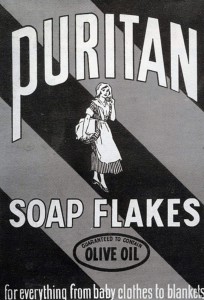
If Marx’s analysis is central to the sociological understanding of the structures that emerged with the rise of capitalism, Max Weber is a central figure in the sociological understanding of the effects of capitalism on modern subjectivity: how our basic sense of who we are and what we might aspire to has been defined by the culture and belief system of capitalism. The key work here is Weber’s Protestant Ethic and the Spirit of Capitalism (1905/1958) in which he lays out the characteristics of the modern ethos of work. Why do we feel compelled to work so hard?
An ethic or ethos refers to a way of life or a way of conducting oneself in life. For Weber, the Protestant work ethic was at the core of the modern ethos. It prescribes a mode of self-conduct in which discipline, work, accumulation of wealth, self-restraint, postponement of enjoyment, and sobriety are the focus of an individual life.
In Weber’s analysis, the ethic was indebted to the religious beliefs and practices of certain Protestant sects like the Lutherans, Calvinists, and Baptists who emerged with the Protestant Reformation (1517–1648). The Protestant theologian Richard Baxter proclaimed that the individual was “called” to their occupation by God, and therefore, they had a duty to “work hard in their calling.” “He who will not work shall not eat” (Baxter, as cited in Weber, 1958). This ethic subsequently worked its way into many of the famous dictums popularized by the American Benjamin Franklin, like “time is money” and “a penny saved is two pence dear” (i.e., “a penny saved is a penny earned”).
In Weber’s estimation, the Protestant ethic was fundamentally important to the emergence of capitalism, and a basic answer to the question of how and why it could emerge. Throughout the period of feudalism and the domination of the Catholic Church, an ethic of poverty and non-materialist values was central to the subjectivity and worldview of the Christian population. From the earliest desert monks and followers of St. Anthony to the great Vatican orders of the Franciscans and Dominicans, the image of Jesus was of a son of God who renounced wealth, possessions, and the material world. “It is easier for a camel to go through the eye of a needle, than for a rich man to enter into the kingdom of God” (Mark 10:25). We are of course well aware of the hypocrisy with which these beliefs were often practiced, but even in these cases, wealth was regarded in a different manner prior to the modern era. One worked only as much as was required. As Thomas Aquinas put it “labour [is] only necessary … for the maintenance of individual and community. Where this end is achieved, the precept ceases to have any meaning” (Aquinas, as cited in Weber, 1958). Wealth was not “put to work” in the form of a gradual return on investments as it is under capitalism. How was this medieval belief system reversed? How did capitalism become possible?
The key for Weber was the Protestant sects’ doctrines of predestination, the idea of the personal calling, and the individual’s direct, unmediated relationship to God. In the practice of the Protestant sects, no intermediary or priest interpreted God’s will or granted absolution. God’s will was essentially unknown. The individual could only be recognized as one of the predestined “elect” — one of the saved — through outward signs of grace: through the continuous display of moral self-discipline and, significantly, through the accumulation of earthly rewards that tangibly demonstrated God’s favour. In the absence of any way to know with certainty whether one was destined for salvation, the accumulation of wealth and material success became a sign of spiritual grace rather than a sign of sinful, earthly concerns. For the individual, material success assuaged the existential anxiety concerning the salvation of his or her soul. For the community, material success conferred status.
Weber argues that gradually the practice of working hard in one’s calling lost its religious focus, and the ethic of “sober bourgeois capitalism” (Weber, 1905/1958) became grounded in discipline alone: work and self-improvement for their own sake. This discipline of course produces the rational, predictable, and industrious personality type ideally suited for the capitalist economy. For Weber, the consequence of this, however, is that the modern individual feels compelled to work hard and to live a highly methodical, efficient, and disciplined life to demonstrate their self-worth to themselves as much as anyone. The original goal of all this activity — namely religious salvation — no longer exists. It is a highly rational conduct of life in terms of how one lives, but is simultaneously irrational in terms of why one lives. Weber calls this conundrum of modernity the iron cage. Life in modern society is ordered on the basis of efficiency, rationality, and predictability, and other inefficient or traditional modes of organization are eliminated. Once we are locked into the “technical and economic conditions of machine production” it is difficult to get out or to imagine another way of living, despite the fact that one is renouncing all of the qualities that make life worth living: spending time with friends and family, enjoying the pleasures of sensual and aesthetic life, and/or finding a deeper meaning or purpose of existence. We might be obliged to stay in this iron cage “until the last ton of fossilized coal is burnt” (Weber, 1905/1958).
2.2. Living in Capitalist Society
One of the key arguments that sociologists draw from Marx’s analysis is to show that capitalism is not simply an economic system but a social system. The dynamics of capitalism are not a set of obscure economic concerns to be relegated to the business section of the newspaper, but the architecture that underlies the newspaper’s front page headlines; in fact, every headline in the paper. At the time when Marx was developing his analysis, capitalism was still a relatively new economic system, an economic system characterized by private or corporate ownership of goods and the means to produce them. It was also a system that was inherently unstable and prone to crisis, yet increasingly global in its reach. Today capitalism has left no place on earth and no aspect of daily life untouched.
As a social system, one of the main characteristics of capitalism is incessant change, which is why the culture of capitalism is often referred to as modernity. The cultural life of capitalist society can be described as a series of successive “presents,” each of which defines what is modern, new, or fashionable for a brief time before fading away into obscurity like the 78 rpm record, the 8-track tape, and the CD. As Marx and Engels put it, “Constant revolutionizing of production, uninterrupted disturbance of all social conditions, everlasting uncertainty, and agitation distinguish the bourgeois epoch from all earlier ones. All fast-frozen relations … are swept away, all new ones become antiquated before they can ossify. All that is solid melts into air…” (1848/1977, p. 224). From the ghost towns that dot the Canadian landscape to the expectation of having a lifetime career, every element of social life under capitalism has a limited duration.
Key Terms
alienation: The condition in which an individual is isolated from his or her society, work, sense of self and/or common humanity.
anomie: A situation of uncertain norms and regulations in which society no longer has the support of a firm collective consciousness.
bourgeoisie: The owners of the means of production in a society.
class consciousness: Awareness of one’s class position and interests.
collective conscience: The communal beliefs, morals, and attitudes of a society.
disenchantment of the world: The replacement of magical thinking by technological rationality and calculation.
false consciousness: When a person’s beliefs and ideology are in conflict with his or her best interests.
industrial societies: Societies characterized by a reliance on mechanized labour to create material goods.
iron cage: A situation in which an individual is trapped by the rational and efficient processes of social institutions.
mechanical solidarity: Social solidarity or cohesion through a shared collective consciousness with harsh punishment for deviation from the norms.
organic solidarity: Social solidarity or cohesion through a complex division of labour, mutual interdependence and restitutive law.
proletariat: The wage labourers in capitalist society.
rationalization: The general tendency in modern society for all institutions and most areas of life to be transformed by the application of rationality and efficiency.
social class: A group defined by a distinct relationship to the means of production.
social integration: How strongly a person is connected to his or her social group.
social structure: General patterns of social behaviour and organization that persist through time.
Section Summary
2.1. Theoretical Perspectives on the Formation of Modern Society
Émile Durkheim believed that as societies advance, they make the transition from mechanical to organic solidarity. For Karl Marx, society exists in terms of class conflict. With the rise of capitalism, workers become alienated from themselves and others in society. Sociologist Max Weber noted that the rationalization of society can be taken to unhealthy extremes. Feminists note that the androcentric point of view of the classical theorists does not provide an adequate account of the difference in the way the genders experience modern society.
Section Quiz
2.1. Theoretical Perspectives on Society
1. Organic solidarity is most likely to exist in which of the following types of societies?
- hunter-gatherer
- industrial
- agricultural
- feudal
2. According to Marx, the _____ own the means of production in a society.
- proletariat
- vassals
- bourgeoisie
- anomie
3. Which of the following best depicts Marx’s concept of alienation from the process of one’s labour?
- A supermarket cashier always scans store coupons before company coupons because she was taught to do it that way.
- A businessman feels that he deserves a raise, but is nervous to ask his manager for one; instead, he comforts himself with the idea that hard work is its own reward.
- An associate professor is afraid that she won’t be given tenure and starts spreading rumours about one of her associates to make herself look better.
- A construction worker is laid off and takes a job at a fast food restaurant temporarily, although he has never had an interest in preparing food before.
4. The Protestant work ethic is based on the concept of predestination, which states that ________.
- performing good deeds in life is the only way to secure a spot in Heaven.
- salvation is only achievable through obedience to God.
- no person can be saved before he or she accepts Jesus Christ as his or her saviour.
- God has already chosen those who will be saved and those who will be damned.
5. The concept of the iron cage was popularized by which of the following sociological thinkers?
- Max Weber
- Karl Marx
- Émile Durkheim
- Friedrich Engels
6. Émile Durkheim’s ideas about society can best be described as ________.
- functionalist.
- conflict theorist.
- symbolic interactionist.
- rationalist.
Further Research
2.1. Types of Societies
The Maasai are a modern pastoral society with an economy largely structured around herds of cattle. Read more about the Maasai people and see pictures of their daily lives: http://openstaxcollege.org/l/The-Maasai
2.2. Theoretical Perspectives on Society
One of the most influential pieces of writing in modern history was Karl Marx and Friedrich Engels’ The Communist Manifesto. Visit this site to read the original document that spurred revolutions around the world: http://openstaxcollege.org/l/Communist-Party
Solutions to Section Quiz
1 B, | 2 C, | 3 D, | 4 D, | 5 A, | 6 A [Return to quiz]

